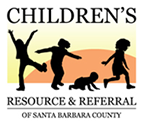Santa Barbara
PrintStatewide Child Care Search

MyChildCarePlan
Search for child care using a statewide search tool by location. You can also contact your local Child Care Resource and Referral Agency for more details, support, and to talk to a specialist about your individual child care needs.Child Care Resource & Referral Agencies

Children’s Resource & Referral Program
Contact your local Child Care Resource and Referral Agency using the website information here to access the child care search tool or call 1-800-KIDS-793 (1-800-543-7793) for more information and support.
County Program Profile: Santa Barbara
Time Period: 2019–2020
QRIS :: Quality Counts Santa Barbara
 Why Quality Matters? Teachers, caregivers, and directors in child care and preschool programs work hard every day to help children learn, grow, and thrive. It’s critically important work: 90% of a child’s brain development happens by age five and the relationships young children have with their teachers and caregivers shape their learning. The experiences children have in their first years profoundly shape their ability to succeed in school and life. When young children receive high-quality early learning they are better prepared for school and life at large.
Why Quality Matters? Teachers, caregivers, and directors in child care and preschool programs work hard every day to help children learn, grow, and thrive. It’s critically important work: 90% of a child’s brain development happens by age five and the relationships young children have with their teachers and caregivers shape their learning. The experiences children have in their first years profoundly shape their ability to succeed in school and life. When young children receive high-quality early learning they are better prepared for school and life at large.
County Contact Information
website
contact
Taundra Pitchford
phone
805-964-4710
Funding Streams
- First 5 Santa Barbara County
- CDE
- Santa Barbara Foundation
Partner Agencies
- Children’s Resources and Referral
- First 5 Santa Barbara County
- SBCEO
Process to Outreach/Onboard Programs and Providers
Establish program waitlist in 2019, actively onboarding in 2020–21
Quality Improvement Program Support Strategies
Coaching, trainings, leadership project, mentoring, mental health local supports
Local Approach to Offering Financial Incentives and Stipends
Workforce Pathways Grant & Dual Language Learner Grant
How Children Are Served by QCC
QCC Settings
Children Served by Setting
Overall Child Characteristics and Services Provided
Children’s Races and Ethnicities
QCC Tier Rating Distribution
Language Spoken with Children
Testimonial
Center director shared: I thought I had a great program until I enrolled in the QCC program. Now I look at everything through a different lens.
Teacher, State-Funded Preschool Operated by LEA
Success Story
Director shared: if it wasn’t for the collaboration established during COVID-19, she would have walked away from her center. Building relationships has been one of the benefits during this pandemic.
